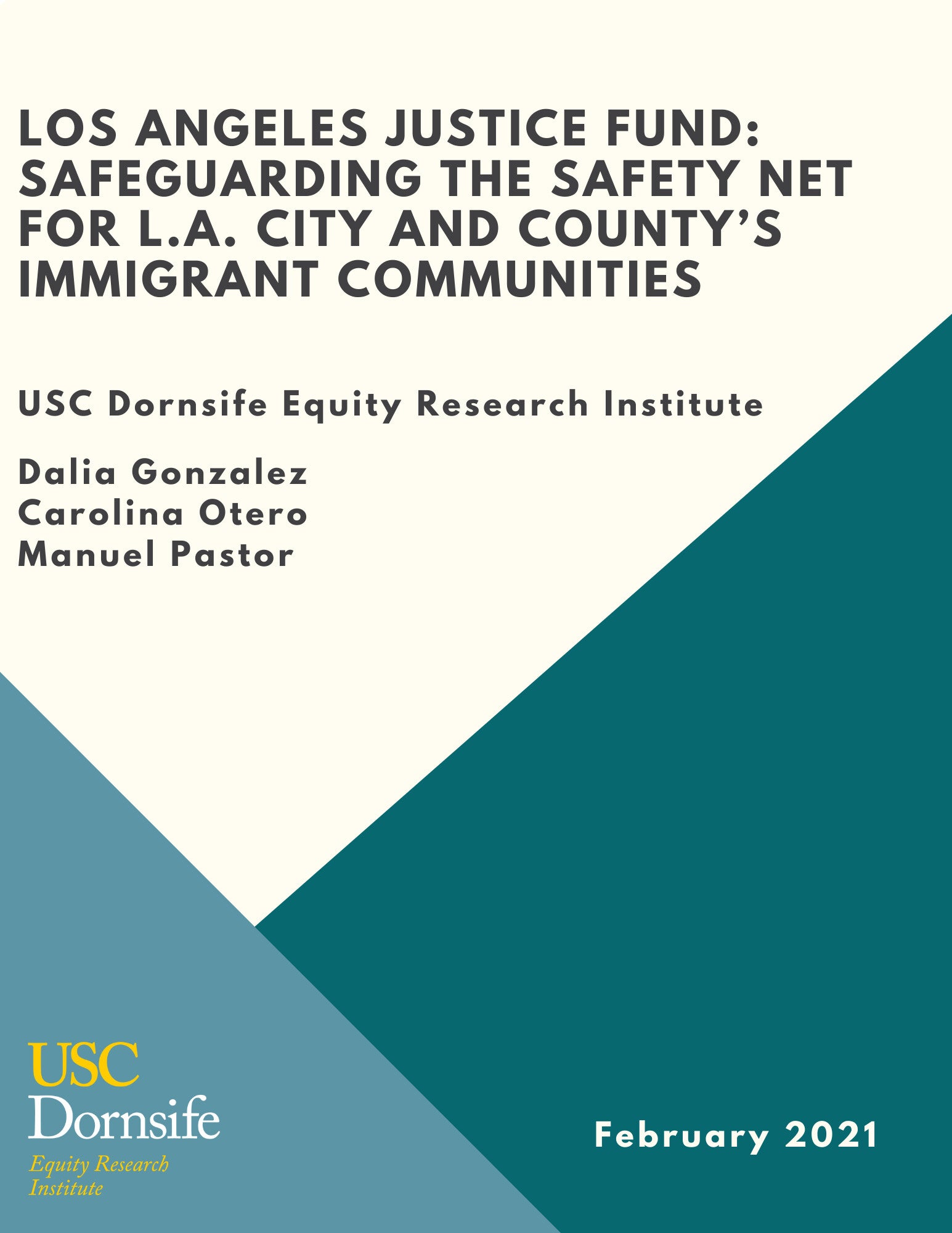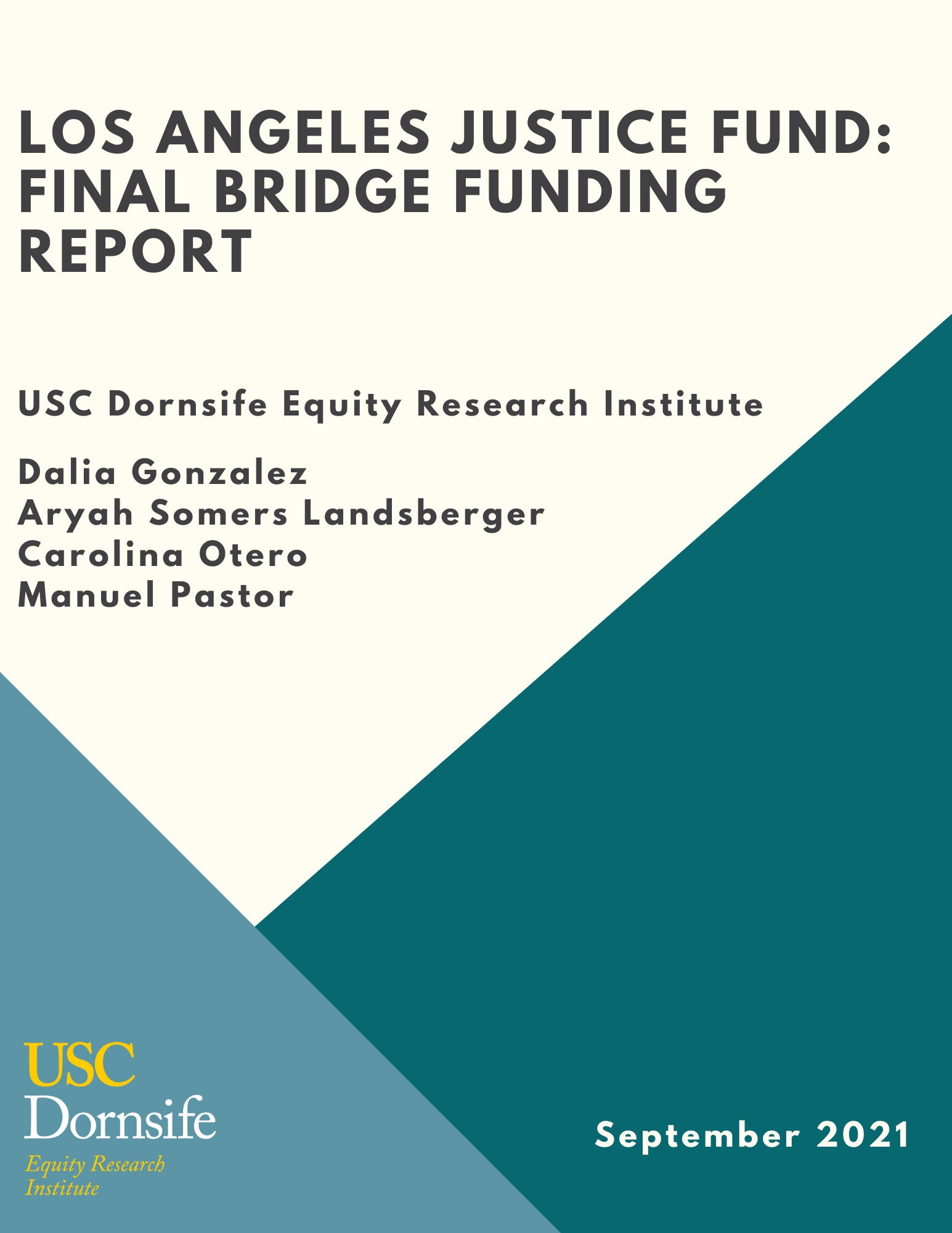2021
By Aryah Somers Landsberger, Carolina Otero, Dalia Gonzalez, Manuel Pastor, and Rhonda Ortiz
Please note: reports dated earlier than June 2020 were published under our previous names: the USC Program for Environmental and Regional Equity (PERE) or the USC Center for the Study of Immigrant Integration (CSII).

Launched in 2017, the Los Angeles Justice Fund (LAJF), is a public-private partnership with the City and County of Los Angeles, the Weingart Foundation, and the California Community Foundation, created in response to the Trump administration’s anti-immigrant policies. The goal of this partnership is to provide free legal representation to immigrant Angelenos in deportation proceedings. To date, LAJF has completed its objectives of: ensuring access to due process for the most vulnerable community members; building and strengthening the removal defense capacity of the legal services infrastructure in the City and County of Los Angeles; providing legal representation to a minimum of 742 vulnerable residents; assessing the ability of public‐private partnership to maximize support for immigrants; and learning best practices for sustainable investments in deportation defense and enhancing the impact of initial investments. All of this happened during one of the most difficult years in our lifetime for immigrants, as substantial changes were made to asylum and immigration law, and as fear swept across communities due to xenophobia and anti-immigrant policies that were implemented from the nation’s capital. LAJF, so key to protecting and safeguarding families facing deportation and removal proceedings was set to expire in 2020. Yet, an additional year of critical bridge funding (2020-2021) was approved by the City and County of Los Angeles to ensure that Angeleno immigrants and their families continued to receive high-quality legal representation and due process, during a time when the country faced the formidable challenges of the COVID-19 pandemic. Our reports, prepared for the City, County, and philanthropy, were designed to provide data and narrative from LAJF’s pilot and bridge funding phases, broader context for understanding why legal representation is important, and key takeaways for the Fund’s continuation.
Key takeaways include:
- While case progress slowed in recent quarters, this was due to a combination of factors, including the complex nature of deportation cases, policies enacted under the Trump administration, the impact of the COVID-19 pandemic, and uncertainty of future funding.
- LAJF has and can continue to support some of the most vulnerable immigrants who may not have otherwise been represented. While there were limitations to the design of the Fund, LAJF grantees were able to assist some of the most marginalized immigrants facing deportation such as unaccompanied minors, victims of domestic violence, immigrants seeking asylum, immigrants in detention, and LGBTQ+ immigrants.
- For immigrants with active cases or unfavorable outcomes, having access to legal representation and remaining united with their family in the process, is a success in and of itself. The Fund strengthened L.A. City and County’s safety net by screening a minimum of 2,208 for legal remedies and accepting a minimum of 742 cases for representation.
- LAJF is a program that benefits all Angelenos and as such, should provide representation to all immigrant Angelenos, including those with former criminal convictions. Given what we know of overcriminalization and the disproportionate impact for Black immigrants, this constraint on program performance contributed to a low volume of new cases acquired over time.
- LAJF significantly bolstered the City and County’s deportation defense infrastructure. While a crucial investment, LAJF is just one part of the broader commitment to immigrant integration that should be expanded to respond to changes that emerge at the federal level, including affirmative immigration relief.
Maintaining and expanding the resources that have already been created for such a vulnerable community that contributes so much, but is given so little in return is critical to the collective wellbeing of Los Angeles during a time when our recovery from a global pandemic has taught us not to look back, but rather look forward with racial equity as a guiding principal.





